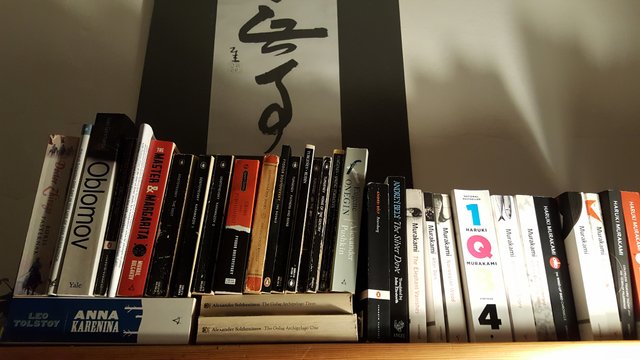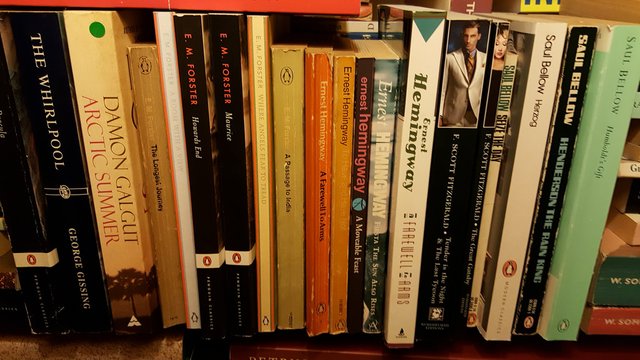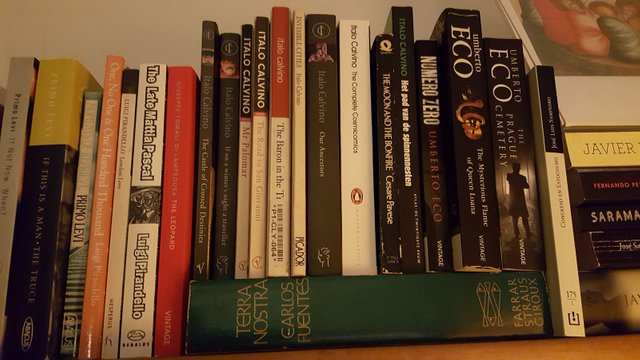Who listens to the classics? Musings on audio-books.
Is anybody else in the Steemit Community catching up on their Classics via Audio-Books?
- Where do you get them from? (Cos, boy, can't they set you back a pretty penny! And memberships come with a never ending array of hitches and glitches.)
I've been asking myself the following questions, since I started on my book-reading-listening challenge (outside the non-fiction specialised reading I always did, already) in December 2015.
- Why listen to which book when?
- When does it not work to be read to by a stranger (or better/worse a famous actor)?
- What's the difference to listening (on the go?) compared to taking the text in with your own (inside) voice off the print infront of you? (Thoughts on why e-reading - v paper-edition - does or does not work for you also welcome!)
- Does listening make for a closer reading or a more superficial one? Does it help you stick with it? Get through a terser work more swiftly - by bringing it alive? By sharing it with the narrator/performer? For extroverted or ADHD type minds it may help to walk or be active while listening , even having some traffic and crowds to manouver through - but I wouldn't cycle or drive with a book on my ears!
- When does it not work to be read to by a stranger (or better/worse a famous actor)?
I found it a great help for books I felt (stupidly) I didn't have the time to get stuck into (the Russian fatties or the French realists) but was willing to give a go whilst cleaning the shower or making soup. I ended up delving in deeper and deeper into these works thanks to the "leg up" with audio recordings. I tended to get a printed text alongside to ensure a thorough reading and often did much additional research to boot.
Clearly, the audio-book sellers are tailoring mainly to a different kind of reader than myself. Lordy-Lord, there is quite a lot of pulp out there if you want it! It would make me weep for the trees if it weren't all digitalised (although most of it is available both in print aswell as in MP3...).
I would not call myself someone who reads as a leisure activity. Ridiculously, I feel a lot of pressure to read much, quickly (with eyesight, but also hearing deteriorating fast). Also, if I ever want to put a proper pen to paper myself, I realised, it's only common courtesey to have read widely, avidly and with much pleasure. So I am practicising and discovering whether the world of literature is really something for me.
What is it about writing that so many of us want to do it? Are we hoping to immortalise ourselves? Have we something that unique yet relevant to share? Is it a self-soothing occupation? I think any of these reasons to write would be doomed to fail. There has to be a writer in you before you start to write, no different to a singer, who can only do so much with singing lessons to reach fame and fortune (which is a measure of what exactly?)
There is something about the great writer that is gilded by some kind of spiritual purpose, as if they are under the auspices of Hermes, the winged messenger god, enriching our dimension of life and time. Or do we poet and imagine, narrate and explore for the entertainment of the gods (so they send muses for their benefit not ours; and we perform as authors like like court jesters).
Even if I ever did finish writing my novel, and by some miracle it was just about readable, I am under no illusion that it would be published. It is very much the luck of the draw and you have to have a "likeability" factor; it's not just about sitting in the shed at the bottom of your garden and submitting an envelope with a type-written manuscript. You need to be prepared to "go professional", negotiate, entertain a working relationship with an employer (your publishing agent) like in any other profession. You will need a "public personality" to cope with all the promotion that comes with the job of selling your printed work - even if it's only in the blurb. Then, when you are successful, editors will want to read drafts in installments and stay hot on your tail for more copy. Perish these thoughts! Where is the romance of writing?!
- What would you call a classic?
- Which modern novelists might become classics?
I am trying to fill in the lacuna on the English, French, German and Russian front, but also pick up the occasional Eastern European (Szabó), Italian (Calvino, Pirandello, Lampedusa), Swede (Backman for a lighter note), Norwegian (yes, all of Knausgaard...), Spaniard or Latin American (Sampedro, Moreiro) and my dear (Japanese) Murakami. Even just read a Chinese novel by Mo Yan and the Portuguese Pessoa needs another once-over soon.
And so I travel around the world by means of my headphones.
The picture at the top, displays Hemmingway, Bellow and Fitzgerald, so I don't give the Americans a total miss, but I've been disappointed by my latest tries (and notably the females: Siri Hustved, Claire Messud, and please don't mention Jennifer Egan again...). Auster has become an old and tediously serious pedant (I enjoyed his snazzier earlier work) and I saw the film on Foster Wallace and I think I will indulge myself for a bit and keep it at that. It's all a bit s p e l l e d o u t into the infinite and back again on that side of the Pond....
I don't think I have a preferred genre. It's a typical thing of mine not to work too much with personal preferences - I think it's probably due to a worry that otherwise I might miss something and get stuck on limiting personal tastes! Maybe, one day I will be wise enough or confident enough in my learning that I can narrow my field of interest. It's not to say I don't know what I like, or especially what I don't like, but would I dare share this as anything sensible to say about another person's work? Does my spontanous reaction say anything about their writing or about my reading, and is my reading at all relevant to their writing (no!) or anybody else's reading? Probably not, yet, I have gone on other people's reviews, which makes me question,
what makes a good reviewer?
Out of all the thousand literature or literary criticism students, a handful get a paid job reviewing books for papers, journals and websites. Once you've been published as a writer, the job may also fall to you, once in a while. But what makes you especially qualified? Say you are Dave Eggers or Paula Hawkins? Why does a large national newspaper choose this particular reviewer, who will be telling us who we should be reading out of hundreds of new authors-to-watch annually? It's the same mystery to me regarding prizes (ever more of them every year!). I somehow always remain non-plussed regarding most of the nominees. I'm not even talking about the Nobel Prize, anymore...!
Is it largely marketing? Is it pretty much all here today, gone tomorrow? But what about the ones who make great reads time and again, an Ali Smith, Edna O Brien, Ian McEwan or Howard Jacobsen, Jim Crace, Nicole Krauss, Salman Rushdie; some younger, some ancient, some highly awarded, others continuously nominated, they seem to sell the minute they're hot off the press. Are any of them, though, classic-material? And if so, why? As examples of our Zeitgeist? Or purely for being original and authentic? Or for their craft which may be harder or easier to judge with everybody writing and a fair few all very well.
I often think of the unbearable pressures those with a contract must be under: to put out another work fast, to keep the public's interest. Sometimes the pressure shows! It's almost impossible to pump a good one out every year. Even great authors show up pale and wrinkly under this pressure, occasionally. I can't imagine having to live with a less than satisfactory work to your name.
What IS good writing?
What makes good fiction?
Then again, haven't you also discovered, that there are a lot of superb non-fiction writers around who may be even better narrators than half the authors published to make a fast buck? Think of Oliver Sacks, or Julian Barnes on art or the archeologist Barry Cunliffe, the philosopher Markus Gabriel, the traveller (and art-lover) Cees Nooteboom .... . Clearly, good writing is good writing, whatever the format.
But what is good writing? How is it done, and above all:
what does it serve? Why do we read and why should we (if we should at all) read good literature (which surely can exist in any genre - Is Ludlum not a good writer? Or Graham Greene.)?
Are there some genres which per definition never have good writers (penny-dreadfuls, kitchen-romance?). Ballard, or Margaret Atwood and Ursula K. Le Guinn do a lot to bring sci-fi up in the ranks of serious writing. I'm still out on China Mieville and M. John Harrison.
Italo Calvino wrote a book on the subject of classics, already, full of glorious essays on the classics he feels are worth a decent read ("Why Read The Classics"?)


With all those goodies in the bag already, it ought to make any self-respecting writer wonder what they might add to the piles and piles and piles of scattered words arranged into private mandalas...
We won't stop writing soon. At least I won't if you don't...
But I raise a wary eyebrow at all the encouragement handed out so eagerly to the aspiring writer. There are so many writing courses available at colleges, night school, on line; it's said so readily: dare to realise your wildest dreams and go finish your book. I wouldn't really be able to imagine what such creative writing courses teach. Maybe how not to start with "It was a dark and rainy night....
If anybody has had the urge to ponder on the mysterious art of writing mankind has developed, know I'm interested to read you.
I leave you with one of my favorite finds of 2017: Samantha Harvey. An absolute gem. All three of her novels are equally excellent.
Currently listening to Damon Galgut "The Imposter" and "Down And Out" by George Orwell, and "Dangerous Liasons" by Laclos, and Graham Greene's "Our Man in Havanna" and "Autumn Leaves" by André Gide. (Something for every occasion).



This is basically conjecture (having never actually listened to an audio book) but my gut feeling is it wouldn't work well for me. I really plug myself into the written word when reading and can block out everything else very easily - not sure I could do the same and give it the same attention if listening, for some reason. I have a tendency to space off while listening, which is terrible I know, but true.
Definitely some food for thought here though, you ask a lot of good questions :) I am not so sure that there has to be a writer in you before you start to write - I absolutely believe this is a skill and craft that can be learned and honed. I would definitely agree, though, that there has to be a reader in you before you start to write.
Much love - Carl
Lovely to hear your thoughts! I've heard your gut feeling expressed before (also by someone who never even tried....). I don't think audio-books can ever replace the original, but they might add to it (or possibly in some cases, with a bad performance, detract from it!). For me, they are "handy tools" to cram in more reading (which already sounds disrespectful, I agree!). But once you get into it (training up your grounding powers in the here and now! for it takes some discipline to becomes a good listener) it starts to lead a life of its own. It's a niche thing, maybe.
I sometimes wish the writers out there would read more classics, though, for the chatty, cinematographic (bloggy!?) style they seem to be copying from eachother (reading eachother?) is becoming a drag.
I hope you're reading something good (for you!)
Yes, today I read a really lovely author :) Named @sukhasanasister <3
Too cute!